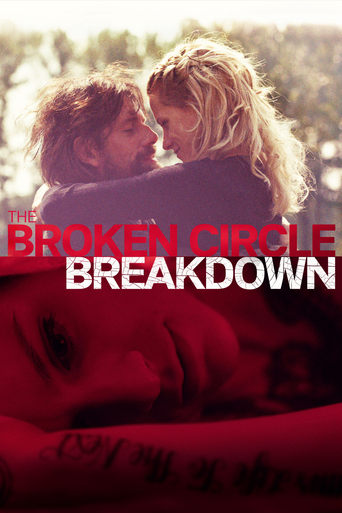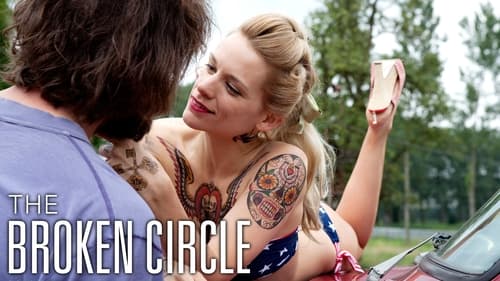



It's an amazing and heartbreaking story.
It’s fine. It's literally the definition of a fine movie. You’ve seen it before, you know every beat and outcome before the characters even do. Only question is how much escapism you’re looking for.
View MoreOne of the best movies of the year! Incredible from the beginning to the end.
View MoreOne of the most extraordinary films you will see this year. Take that as you want.
View MoreSaw this last night on Netflix. Great movie. Characters are fully developed and believable. Dialogue is powerful. Story is heartbreaking. If you are tired of the "Hollywood" produced crap that always ends in a happy ending and is mainly superficial, then this is a movie for you. Real life seldom ends happy, and sometimes you need to find your own happiness. Must see.
View MoreFlemish films are rarely seen outside Belgian Flanders, Brussels or the Netherlands. So when the opportunity arises to see one, what other choice is there but to jump at the chance? As you can imagine, I heeded the call and what happened...: I found myself torn by the pangs of split personality! In other words, "Alabama Monroe" made me at once discover a director I liked and be... repelled by the product of his efforts. Paradoxical indeed! Not that I totally rejected the film. Particularly not in its lively first part...but, let us get things in the right order. What struck me first is how gifted the filmmaker, Felix Van Groeningen ("La merditude des choses"), actually is. Among his qualities, let me mention his brilliant camera work (always close to the characters), the peerless actor's director he proves to be, the very effective use he makes of the bluegrass music (played live and subtly punctuating the action), as well as his impressive mastery of editing (with startling time warps in the past and even in a near future). No doubt about that : Van Groeningen is a master in every department of his art. He must also be credited for his ability to cast the right people in the right place, particularly the ones embodying the lead couple : you can be sure about one thing, no one else could have been a better Didier than the wonderfully cool Johan Heldenbergh, or a more irresistible Elise than Verle Baeten, in turns the most sensual of lovers and the most pathetic of grieving mothers. Both give their all to their role and as if that was not enough, they sing and play music beautifully.This said, how come my impression on "Abama Monroe" is negative? Well, to be fair, I did not dislike the WHOLE thing. I can even say I adored its first part. The potent mutual attraction of the two characters, their shared fiery passion, their common love of music and all things unconventional is really infectious and did carry me away. The trouble is that when misfortune rains down on them, it is not by halves! Granted, what happened to them is far from rosy, Maybelle, the fruit of their love being affected by cancer, but making the second half an uninterrupted spectacle of Elise and Johan's terrible suffering, bitter disagreement, heated arguments and final estrangement is a disputable choice. For now the film has become indulgent, dwelling exclusively on the centrifugal force that violently pulls the couple apart. And three words come to me: Enough is enough! As a matter of fact, Van Groeningen seems to have forgotten that to really move the viewer, there is nothing like modulating the tone. It is a known fact that remaining on a single note rather generates annoyance than emotional appeal, which someone like Valérie Donzelli has perfectly understood. Unlike "Alabama Monroe", her "La guerre est déclarée", the film she made on a similar subject (a loving couple put to the test by their child's cancer), managed to remain in constant balance. Cruelty, suffering, outcry there was naturally, but also a touch of surprise, of humour and even of incongruousness. French director-actress deftly avoided bathos by refusing to add misery to misery, pain to pain, yelling to yelling. In the second part of Alabama Monroe", it is just the contrary, so much so that, two-thirds through Van Groeningen (otherwise excellent) film, I couldn't stand it any more and begged for mercy!All in all, it is this final bad impression that actually accounts for the paradoxical statement I made at the beginning of this commentary. And I repeat it: "Alabama Monroe is a good film I dislike". Which will not prevent me from viewing other works by its talented director. In a more mellow tone, with a more balanced approach, I may even think another of his films is a masterpiece.
View MoreUniquely combining bluegrass music classics, family drama and relationship studies into one Belgian infused heavy hitter, Felix van Groeningen's Oscar nominated The Broken Circle Breakdown isn't by any means an easy watch but it's a film that offers up many moments of joy, many moments of heartache and features some outstanding acting turns and musical renditions in a familiar like tale that would be nigh on impossible not to respect.Groeningen delivers his film in a way that may be off-putting to some and it's right to say that at times his structure of flashbacks, flash-forwards and present time scenes combine to create a somewhat disjointed feel to proceedings that weaken emotional ties to what is occurring due to a lack of audience engagement, but when Groeningen nails his scenes, there a sight to behold. Scenes centred around couple Didier and Elise and there young daughter Maybelle are fantastically well played, Didier and Elise's bands musically staged scenes are often highly entertaining and at one pivotal stage moment, incredibly moving and interplay between actors Johan Heldenbergh and Veerle Baetens delivers some of the best one/two double acts by male and female actors of recent memories.Creating a couple that throughout remains empathetic, relatable and likable, leads Baetens and Heldenbergh (who also co-wrote the screenplay) are wholeheartedly in tune with their characters and their ability to not only act but to sing is an incredibly feat of acting. Both Baetens and Heldenbergh are tasked with many a varied range of emotions, from lofty heights to lowly lows and whether it's at the peak of happiness or the despair of unhappiness, Elise and Didier feel real thanks to these two actors. Didier and Elise's love story in many ways reminds one of Blue Valentine, an intimate and raw love that overtime has been torn at by the harsh twists of life and the structure to Broken Circle Breakdown does feel reminiscent of Derek Cianfrance's tale as previously mentioned in its flash forwards, flashbacks and present day scenes.An occasionally joyous, often sombre and sometimes beautifully moving, The Broken Circle Breakdown absolutely deserved the critical and award plaudits it received the world over thanks to its fine movie making, high calibre acting and perfectly constructed soundtrack. A tale not to uplift but to in its unique way inspire, this is a film all lovers of classy dramas, world cinema and connoisseurs of toe tapping bluegrass should track down at the next available opportunity.4 and a half terandas out of 5 For more movie reviews and opinions check out - www.jordanandeddie.wordpress.com
View MoreThe Belgian feature The Broken Circle Breakdown has a booming political voice and a pair of committed performances but as a film it does not work. It is apparent that the narrative was moulded heavily for the screen but without fully embracing and adapting to the filmic medium. The story is about a couple named Didier (Johan Heldenbergh) and Elise (Veerle Baetens). They have been a couple for seven years and sing together in a bluegrass band. Didier wants to live like a cowboy because he loves American country music and Elise, while covered in her own tattoos that detail her previous relationships, is running a tattoo parlour. The couple is told their five year old daughter Maybelle (Nell Cattrysse) has been diagnosed with cancer. Using a non-linear structure, the director Felix van Groeningen cuts between this present day crisis and then back to when the couple first met. He also flashes forward to a pivotal future moment when Elise herself is being rushed to hospital. The shape of the narrative is a stylistic choice rather than a psychological one because the time shifts do not enrich the depth or meaning of the lives of the characters. The lead work by Johan Heldenbergh (Didier) and Veerle Baetens (Elise) is adequate and the music is cheerful but in spite of the bleak premise the film isn't an emotional force.The fate of a child and the subsequent breakdown of the family unit isn't a new idea either because there have been an immeasurable number of films depicting this tragedy. Lars von Trier's Antichrist (2009) is one of the recent and grimmer examples. For Groeningen the adaptation process is a far greater problem than originality. The script he and Carl Joos have written is from the play "The Broken Circle Breakdown Featuring Cover-Ups of Alabama", by Heldenbergh himself and Mieke Dobbels. One of the difficulties with translating a play to a film is the contrasting forms of the two mediums. A play is almost entirely dialogue driven, while cinema is largely a visual medium, relying heavily on images to tell a story. The play apparently featured a number of monologues that Groeningen admits would not have been cinematic if they were included in the film. Consequently, some of the characterisation has been lost and the two characters seem rather flimsy. Groeningen has also said that he has not plotted the film through story but emotion, which accounts for why it isn't very eventful till late in the piece and why it lacks a strong through-line. Similarly, Maybelle's sickness forces the two adult characters to be reactionary and express themselves largely from their emotions and dialogue, like a play, rather than providing them with something to act upon. The music performances are injected to redeem this problem and to provide more "action". They are a pleasant diversion, even though the instruments are sometimes too loud for the singing voices. The bumps in the script must have been visible to Groeningen because he tries hiding them within the non-linear storytelling. He admitted that the structure was developed in the film's editing process. For a little while the dual timelines dissolve the story's dramatic simplicity. A slick overlap between the timelines contrasts Didier and Elise building a home for their child and then cuts to the present as they bring Maybelle back to the finished property from the hospital. However, the structure is largely window-dressing, covering for what is mostly a simple melodrama with loud political ideas. Didier and Elise exist to verbalise an ideological and social debate. When tragedy strikes, Didier blames the Bush administration for fighting against stem cell research, while Elise is driven by her faith and the possibility of spiritual healing. The director offers no subtlety in expressing Didier's atheist viewpoint. He zooms in on footage of George W. Bush speaking on television and allows Didier to yell at an audience, in monologue style, about the failures of the US government and religious conformity. The play originally came out in 2008, just a year after the Bush administration was replaced. The scientific debate would have been timelier several years ago. Once the tragedy unfolds and the flashy narrative structure is pared back, the film's verbal friction takes over and the parents blame each other for the grief in their lives. But everything is pitched at such an overly melodramatic level that I found myself resisting the film rather than being moved by it.
View More